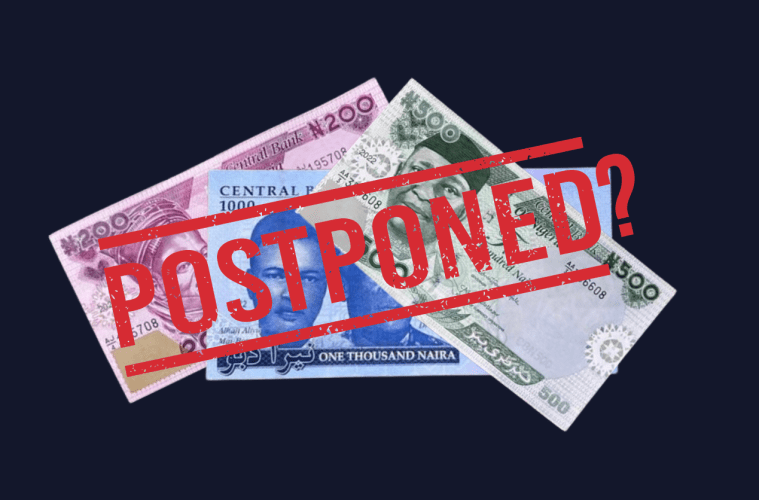In addition to the widespread confusion as to what naira notes are recognized as legal tender, it is important to highlight that the Supreme Court lacks the jurisdiction to preside over matters concerning the CBN.
On Friday, the Attorney General of the Federation and Minister of Justice, Abubakar Malami said the federal government will obey the Supreme Court’s ruling on the use of old naira notes, which has stopped the Central Bank of Nigeria (CBN) from enforcing its 10 February currency recall deadline.
On 08 February, the court suspended the CBN’s deadline after an order was brought before it by three states challenging the CBN’s naira redesign policy. The court has adjourned to 15 February for the matter to be heard. A seven-member panel led by Justice John Okoro temporarily stopped the CBN from carrying out the scheduled ban of old naira notes in N200, N500 and N1,000 denominations in a short ruling.
The order was brought by three states following an ex parte application. In a motion filed on 03 February, Kaduna, Kogi, and Zamfara states asked the court to issue an interim injunction against the government, pending the hearing and determination of their suit challenging the CBN’s naira redesign policy.
An earlier ruling made by the Federal High Court, stopped the CBN, President Muhammadu Buhari and 27 commercial banks from suspending or interfering with the 10 February deadline. However, the Supreme Court ranks higher than the Federal High Court and as such, its decisions take priority over the lower courts of record.
On one hand, the Supreme Court lacks the jurisdiction to preside over matters concerning the CBN, which makes the ruling problematic. On the other, the action was instituted against the federal government, not the bank. This has contributed to the widespread confusion on what naira notes are recognized as legal tender.
In its preliminary objection to the suit, the federal government argued that the Supreme Court lacked the jurisdiction to entertain the matter as the CBN is a statutory body that could sue and be sued in its name.
Malami explained, saying:
What we have at hand is a situation where the central bank was not joined as a party and if the central bank as an institution was not joined as a party, the position of the law is clear that the original jurisdiction of the Supreme Court cannot be properly invoked.
The 1999 Constitution outlines the subject matters that each court in Nigeria is empowered to entertain. If a court lacks jurisdiction, its decisions may be declared null and void, and the parties involved may begin the matter afresh in a different court with proper jurisdiction.
The issue in contention borders on currency control and regulation, which falls within the exclusive jurisdiction of the federal government. In line with Section 251 of the Constitution, the proper court to exercise jurisdiction over matters of currency between the agent of the federal government and any person or entity is the Federal High Court, not the Supreme Court.
Section 232 (1) of the 1999 Constitution provides that:
…the Supreme Court shall, to the exclusion of any other court, have original jurisdiction in any dispute between the federation and a state or between states if and in so far as the dispute involves any question (whether law or fact) on which the existence of a legal right depends.
While Section 251(d) provides that the Federal High Court shall have and exercise jurisdiction:
…connected with or pertaining to banking, banks, other financial institutions, including any action between one bank and another, any action by or against the Central Bank of Nigeria arising from banking, foreign exchange, coinage, legal tender, bills of exchange, letters of credit, promissory notes and other fiscal measures.
There’s a legal phrase in reference to the Supreme Court which says ‘we are not final because we are infallible, but we are infallible only because we are final’. This simply means while the Supreme Court is not always right, its place as the apex court in the country makes its decision final.
The government and the CBN’s obedience to the ruling simply follow the rule of law, which makes all citizens and institutions within a country accountable to the same laws. However, Malami has disclosed that the government intends to have the order set aside.
Malami said:
The rule of law provides that there has to be obedience to the judgement and orders of the Supreme Court. The rule of law provides that when you are not happy with a ruling you can file an application for setting it aside and in compliance with the rights and privileges vested in us as a government, we are equally looking at challenging the order and seeking for it to be set aside.
As it stands, there is no final decision on the naira notes and Nigerians will have no choice but to wait out the legal proceedings, as well as work around a persisting cash crunch⎈
Recommended Reading
Here are some Republic articles to read for more context on the 2023 General Elections:
The views, thoughts, and opinions published in The Republic belong solely to the author and are not necessarily the views of The Republic or its editors. We want to hear what you think about this article. Submit a letter to the editors by writing to [email protected].



